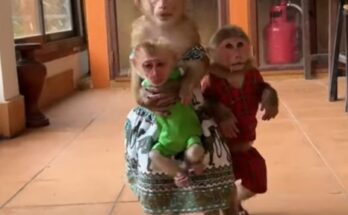Certainly! Here’s a polished, expanded version of your title with around 500 words, along with a new, more refined title suggestion.
Original Title:
Drama queen Luna C-r-y Stop Daddy When Dad Go To Get Things Outside
Expanded Version (500 words):
Luna, a lively and expressive young girl, often finds herself in the midst of emotional moments that capture her vibrant personality. Today, she is playing the role of a true drama queen, her feelings running high as she dramatically cries out to her dad. The scene unfolds when her dad steps outside momentarily to fetch some things, perhaps a toy, groceries, or tools, leaving Luna behind. As soon as she notices her dad leaving, Luna’s emotions surge, and she quickly becomes overwhelmed with feelings of insecurity and longing.
In her eyes, her dad’s departure feels like a moment of abandonment, even if just for a short while. Her dramatic crying is her way of stopping him in his tracks, wanting him to realize how much she needs him. Luna’s tears and protests are loud and heartfelt, embodying her desire for her father’s attention and reassurance. She might be shouting, “Stop, Daddy! Don’t go!” with tears streaming down her face, making her feelings impossible to ignore.
Children like Luna often use theatrical expressions and crying as a way to communicate their emotions—especially when they feel anxious, neglected, or simply want to be part of the action. Her behavior is sometimes seen as dramatic or over the top, but it’s a natural part of her emotional development. It’s her way of saying, “I need you now!” or “Please don’t leave me!” for her small world.
For parents and caregivers, moments like these can be challenging but are also opportunities to teach empathy and patience. Luna’s dramatic cry is a reminder that children’s emotions are genuine and important. When her dad hears her crying and sees her upset, it’s crucial for him to respond with understanding and reassurance. Coming back inside to comfort her, holding her close, and explaining that he will return soon can help Luna feel safe and loved. This simple act of kindness strengthens their bond and teaches her that she can trust that her feelings will be acknowledged.
Luna’s behavior also highlights the importance of consistency and reassurance in a child’s life. When she sees her dad returning after a short absence, her tears may turn into smiles, and her mood lifts. This teaches her that even when she feels upset, her loved ones will be there to support her. It’s a valuable lesson in emotional regulation and trust, key components of healthy development.
In essence, Luna’s dramatic crying when her dad goes outside is a vivid demonstration of a child’s natural need for connection and security. It’s a reminder that behind every tear and shout, there’s a little heart longing for love, attention, and reassurance. As adults, responding with patience and warmth can turn these emotional moments into opportunities for nurturing a strong, trusting relationship.
In conclusion, Luna’s theatrical protest when her dad steps outside underscores the importance of emotional support and understanding from caregivers. Her expressive behavior, while sometimes overwhelming, is a vital part of her growth, teaching her that her feelings are valid and that she is loved.
New Title Suggestion:
Luna’s Dramatic Cry: When She Stops Dad in His Tracks
If you’d like me to craft a shorter summary or a different tone, just let me know!


